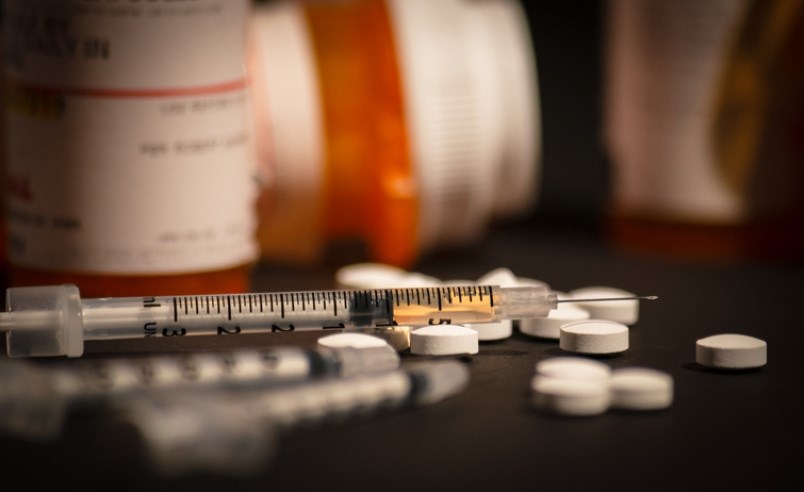As overdose deaths spike in Colorado, Boulder County is no exception to the rising crisis driven largely by the increasing supply of fentanyl.
In 2019, 21 people ages 30-39 were hospitalized in Boulder County due to overdoses — that number was 46 in 2021, more than doubling in two years.
“We estimate that a lot of this increase is due to fentanyl in the drug supply,” said Georgia Babatikos, harm reduction program manager for Boulder County Public Health.
Fentanyl is a synthetic opioid often mixed with other drugs to increase effects, which experts say is driving an increase in overdose deaths.
Babatikos explained that fentanyl is 100 times stronger than other drugs, increasing the likelihood of overdose. In 2020, 93% of drug overdose deaths in Colorado involved fully synthetic opioids included fentanyl, according to a report from the Colorado Department of Public Health and Environment.
She added that because fentanyl is cheap and widely available, it is often used as a filler in counterfeit drugs. Users might not even be aware that it’s present in what they’re taking.
“There are young people trying these for the first time and they think it’s a legitimate Xanax — and it’s the first time they’ve tried anything as well,” Babatikos said. “They’re not expecting fentanyl. They’re not expecting to die on the first pill that they try.”
According to the Colorado Health Institute, fentanyl overdoses have increased tenfold in the state from 2016 to 2020. In 2020, there were 62 drug deaths in Boulder County of which 54 were considered accidental, according to the coroner’s report. Fentanyl was involved in at least 22 of those deaths.
In response to the rising death toll from fentanyl, a bipartisan bill to increase penalties for distributing and manufacturing the drug in Colorado was introduced to the state capitol last week.
As presented, the bill would increase the penalties for dealers caught with smaller amounts of the drug and in cases where dealing the drug leads to death, make more fentanyl test strips and medicine that reverses opioid overdoses available, and force drug users caught with fentanyl into education and treatment programs.
Proponents of the law argue that these increased penalties, paired with harm reduction strategies, are needed to address the fentanyl crisis. However, research has found that overdose deaths don’t correlate with lighter penalties for possession.
“What we do know is that the harsher penalties actually don’t work,” Babatikos said. “The war on drugs did not work. Research shows that people go further underground and more people die.”
Babatikos expressed concern that these measures would mean people witnessing an overdose would be less likely to call the police, actually increasing harm instead.
Alternatively, Babatikos said that harm reduction programs like Boulder County’s the Works Program have had more success in saving lives. The Works Program aims to provide a safe, non-judgmental setting for everyone regardless of current drug use practices.
The Works Program offers harm reduction supplies like sterile supplies, education and resources to people who use drugs in Boulder County. In 2021, the program distributed 1,400 kits of Narcan, a medication designed to reverse the effects of an opioid overdose.
“We had 36 reversals reported to us,” Babatikos said. “That means that 36 people’s lives were saved.”
She explained that managing the fentanyl crisis requires a mix of prevention, harm reduction and treatment options.
“There’s another option to meet people where they’re at,” Babatikos said. “A lot of the people that we work with do end up going into recovery.”
The Works Program partners with the Recovery Cafe Longmont to provide community support and the Boulder County Sheriff’s Office to offer assessment and treatment of opioid use disorder at the Boulder County Jail.
The group also provides public health warnings for program participants, for example if there is an uptick in overdoses. Training for professionals from first responders to school nurses and housing providers on how to use and administer Narcan is another part of their work.
“We’ve been doing a ton of those trainings in the past year,” Babatikos said.
She encouraged people who may be using drugs or have friends or family who are using to get Narcan, which people in Colorado can purchase without a prescription. Go to bringnaloxonehome.org to learn more about how to use Narcan and how to get it.
“A lot of this understanding about harm reduction is to not judge people that use so that they can share that they are using, because the risk of overdosing is much higher,” Babatikos said.
The Works Program has locations across Boulder County, including in Longmont, and the services are free. See hours and locations at www.bouldercounty.org/families/disease/the-works-program/.



